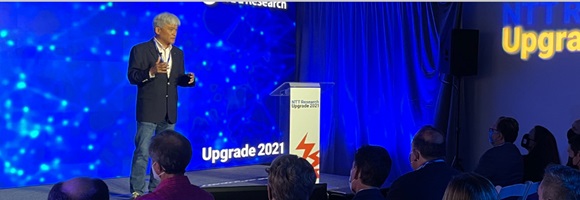NTT Research focused on ‘physics of intelligence’ with Harvard Center for Brain Science
Software development platform companies love AI.
They have (arguably) always been fairly fond of digital intelligence as it has evolved through various decades and iterations that have taken it from the AI we used to consider ‘like in the movies’ throughout the quarter century before the millennium – as it has now progressed to become the AI ‘that’s really real with generative-AI at the fore’ that we consider today.
Because of these core realities, there’s a special relationship between data science, machine learning science and indeed human brain science.
Now working to support this emerging field is NTT Research with its NTT Fellowship Program as part of the NTT Research Foundation.
News this April sees NTT Research, Inc., a division of NTT announce that the NTT Research Foundation has made a gift to establish the Harvard University Center for Brain Science (CBS)-NTT Fellowship Program in the new field of Physics of Intelligence.
The Physics of Intelligence
The two-year gift creates a fund that supports post-doctoral research in the physics of intelligence, an emerging field that uses physics to tackle fundamental questions in intelligence, bridging computer science, neuroscience and psychology. If renewed, the donation could total over US$1.7 million or £1.34 million.
Harvard retains full control over the administration of the fund, which can be used to support two post-doctoral researchers, technology, facilities, travel, guest speakers for seminars and meetings and associated costs.
“We are thrilled to support the Harvard Center for Brain Science at the dawn of the Physics of Intelligence,” NTT Research president and CEO Kazuhiro Gomi said. “As history teaches us, inventions – consider the steam engine, electricity, liquid crystals – can lead to new fields in physics. Today, AI is playing that role and giving us an opportunity to explore fundamental questions involving the science of intelligence, as well as address some urgent practical problems, like the need for computational systems that are unbiased, trustworthy and green. We believe this gift will advance those shared goals.”
This new program will amplify themes that have emerged through a pre-existing relationship between Harvard CBS and the NTT Research Physics & Informatics (PHI) Lab.
Natural & Artificial Intelligence.
Under a 2021 joint research agreement, the two organisations undertook shared research into natural and artificial intelligence. Physicists and AI researchers from the PHI Lab’s Intelligent Systems Group, led by Hidenori Tanaka, who is also a CBS associate, have established fruitful alliances with neuroscientists and psychologists at Harvard.
In collaboration with CBS, Tanaka and PHI Lab Intern and CBS Affiliate Ekdeep Singh Lubana published a paper at ICML 2023 addressing bias in AI using insights from cognitive science. More recently, the team delivered two papers at NeurIPS 2023, addressing the science of generative AI (diffusion models) and the application of AI to neuroscience (recurrent neural networks).
The costs of AI fairness
The former, co-authored by PHI Lab Scientist Maya Okawa, who is also in residence at CBS, and Lubana revealed insights into how generative AI systems learn to imagine and includes an alert about the costs of fairness.
The Harvard CBS is pursuing an ambitious mission. Scientists affiliated with the Harvard CBS study the structure and function of neural circuits; how they give rise to computations that govern thought and behaviour; how those circuits change, develop and vary; and what circuits can become amiss or disordered, yet potentially ameliorated.
Shaping this ongoing academic cross-pollination is the dramatic rise of powerful AI, which provides a new subject of study for the science of intelligence.
The PHI Lab has pushed conventional boundaries before. In a 2020 article in Applied Physics Letters, drawing upon research involving the coherent Ising machine (CIM), PHI Lab Director Yoshihisa Yamamoto and colleagues at Stanford University and the University of Tokyo proposed a multifaceted, theoretical and experimental approach to combinatorial optimization problems that united perspectives from statistics, computer science, statistical physics and quantum optics. In effect: a new field of study.
What is NTT Research?
Under the NTT parent umbrella brand, NTT Research opened its offices in 2019 as a new Silicon Valley startup to conduct basic research and advance technologies that promote positive change for humankind.
Currently, three labs are housed at NTT Research facilities in Sunnyvale:
- The Physics and Informatics (PHI) Lab.
- The Cryptography and Information Security (CIS) Lab.
- The Medical and Health Informatics (MEI) Lab.
NTT stages its industry events every year under various banners – the Japan leg of its user/customer showcase is known as NTT R&D Forum – and this news came forward at the San Francisco-located NTT Upgrade (also known as the ‘upgrade reality’ event), which aims to upgrade reality (and then life in general) in three areas: 1) quantum information, neuroscience and photonics; 2) cryptographic and information security; and 3) medical and health informatics.




